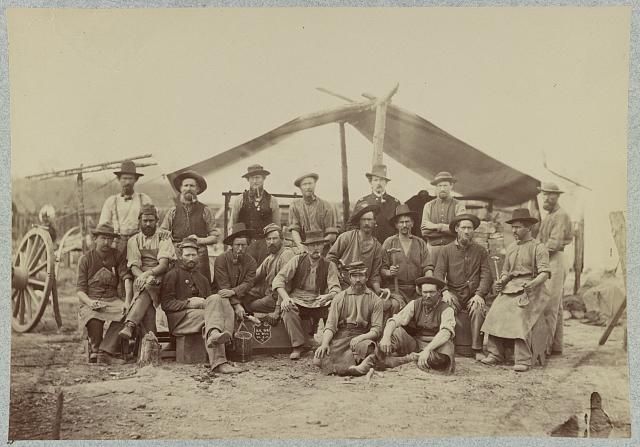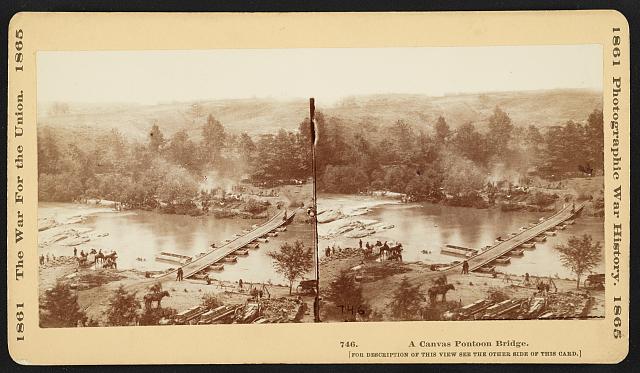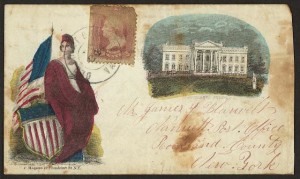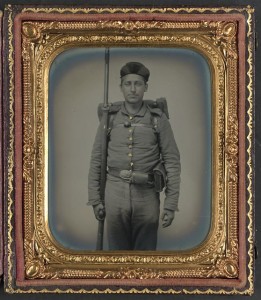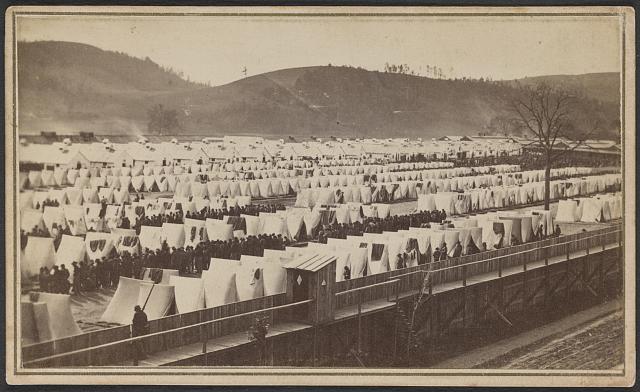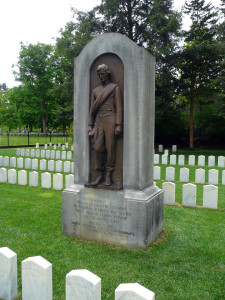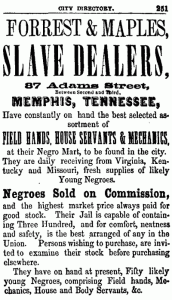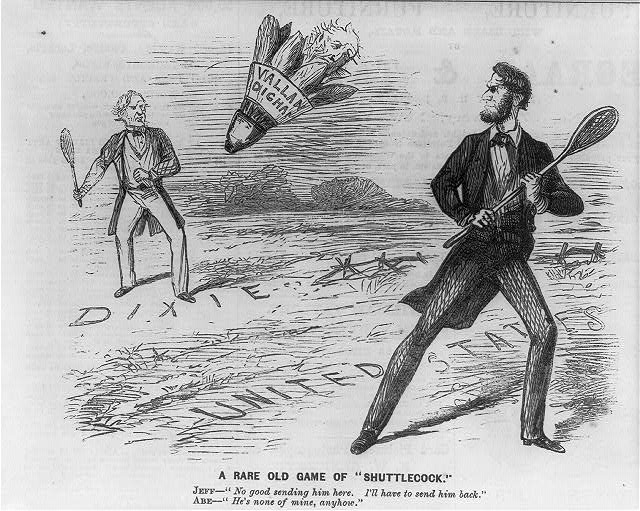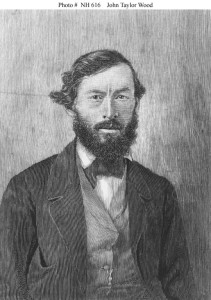-
Recent Posts
Recent Comments
Daily News - 150 Years Ago
General Civil War Sites
Other Resources
WordPress
Topical Paradise
- 19th NY Volunteer Infantry
- 33rd New York Infantry Regiment
- 50th New York Engineer Regiment
- 1860 Election
- Abraham Lincoln
- Andrew Johnson
- Army of the Potomac
- Battle of Fredericksburg
- Benjamin Franklin Butler
- Charleston
- Conscription
- Copperheads
- draft
- Edwin M. Stanton
- Fort Sumter
- George B. McClellan
- George Gordon Meade
- George Washington
- Gettysburg Campaign
- Horatio Seymour
- inflation
- Jefferson Davis
- New York City
- Overland Campaign
- Peninsula Campaign
- Presidential Reconstruction
- Prisoners of War
- Reconstruction
- recruitment
- Richmond
- Robert E. Lee
- secession
- Seneca Falls NY
- Siege of Petersburg
- Slavery
- South Carolina
- Southern Economy
- southern scarcity
- Thanksgiving
- The election of 1864
- Ulysses S. Grant
- Virginia
- William H. Seward
- William Tecumseh Sherman
- World War I
Categories
- 100 Years Ago
- 150 Years Ago
- 150 Years Ago This Month
- 150 Years Ago This Week
- 160 Years Ago
- 400 Years Ago
- 800 Years Ago
- After Fort Sumter
- Aftermath
- American Culture
- American History
- American Society
- Battle Monuments
- Battle of Fredericksburg
- Battlefields
- Books I've Enjoyed
- Chancellorsville Campaign
- Civil War Cemeteries
- Civil War prisons
- Confederate States of America
- First Manassas – Bull Run
- Foreign Relations
- Gettysburg Campaign
- Impeachment
- Lincoln Administration
- Maryland Campaign 1862
- Military Matters
- Monuments and Statues
- Naval Matters
- Northern Politics During War
- Northern Society
- Overland Campaign
- Peninsula campaign 1862
- Postbellum Politics
- Postbellum Society
- Reconstruction
- Secession and the Interregnum
- Siege of Petersburg
- Slavery
- Southern Society
- Technology
- The election of 1860
- The election of 1864
- The election of 1868
- The Election of 1872
- The election of 1920
- The Grant Administration
- Uncategorized
- Veterans
- Vicksburg Campaign
- War Consequences
- World Culture
- World History
- World War I
Subscribe by Feed
Subscribe by Email
“annihilated by their own stomachs”
Captain James H. McDonald of the 50th New York Engineers has already served in the war for over three years. He recovered from being wounded in the arm at Fredericksburg. In this recruiting letter he promoted the Engineers as being the most desirable branch in the service during a siege, at least for the enlisted men. He also believed that if the North had enough will for war and enough men in its armies, it was only a matter of time before the South would succumb.
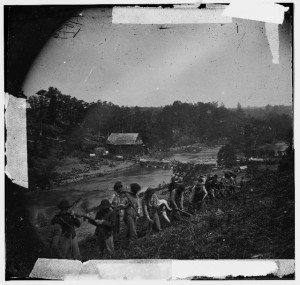
on the regiment’s resume: “Jericho Mills, Virginia. Party of the 50th New York Engineers building a road on the south bank of the North Anna River” May 24, 1864
From a Seneca County, New York newspaper in 1864:
LETTER FROM CAPT. MCDONALD.
HEADQUARTERS 3d BATTALION,
50th N.Y. ENGINEERS, NEAR PETERS-
BURG, Va., August 25th, 1864.
HON. BENSON OWEN – Dear Sir: – I observed in the Courier that you were connected with the recruiting business. As my regiment is one of the most desirable organizations in the service to enlist into, on account of pay, comfort, and chances for promotion to intelligent mechanics, I have taken the liberty of writing you on the subject. There is at present a vacancy for one hundred and fifty men. My Company numbers one hundred and forty-five men, and I can give a place to five good mechanics.
I lost one man killed at the Chickahominy, June 12th, and have had very few men hurt at all; so you see the chances for returning after the war are better than in an infantry regiment. The officers have far more cause to fear being mustered out by the Johnnies’ bullets than the men, because the former have charge of large details of infantry during a siege, while the enlisted men are preparing siege material at a safe distance in the rear.
If there is any branch in the service that has the preference over all others, it is the Engineers, especially to an enlisted man, if he is intelligent, active and persevering. I presume more recruits can be had for the regiment than any other, as I have frequent applications to transfer sergeants of infantry to my Company as privates. Anything you can do for my Company in this way I assure you will be appreciated very highly.
As a friend to the policy of prosecuting the war in the most vigorous manner, you can appreciate our feelings, and justify the sentiments when we say, “Give us more men, and that speedily, and the Rebellion is used up.” If we had one hundred thousand fresh troops given us to-day, the war would end in three months. There is no possible doubt about this; for by simply holding the Rebel forces where they are, and cutting off there communications, they are annihilated by their own stomachs. Give us more men here; roll up a vote this Fall that will strengthen the arm and warm the heart of the soldier, and we will soon come out of this contest victorious.
Yours very respectfully,
JAS. H. MCDONALD,
Captain, 50th N.Y. Engineers.
As stonesentinels points out one enlisted man in the 50th had a bit different view of a siege and its relative safety. A marker at Petersburg quotes Thomas M. Blythe of the 50th:
Monotonous Toil
“The romance of a soldier’s life disappears in a siege. The change of scenery and the lively marches are gone, and the same monotonous unvaried rounds of toil take their place. Sunday and weekday are all alike.”
T.M. Blythe
50th N.Y. Engineers
In his new book, Walt Gable, our County Historian, wrote about an incident involving Captain McDonald and his company from a couple years before this letter:
On August 13, 1862, McDonald’s Company K was ordered to the Chickahominy River, some twenty miles distant, to prepare the way for the army [of the Potomac] to evacuate the peninsula. Arriving at Charles City Court-House, they found a gallows standing in the courthouse yard. An aged Negro told them that it had been used to hang several of his race who had attempted to escape slavery. Company K men used their axes to destroy the gallows and used the wood as a campfire to heat their coffee.[1]
“Stereograph showing an aerial view from the north bank of the North Anna River of a canvas pontoon bridge constructed by the 50th New York Engineers near Jericho Mills, Virginia in May 1864.”
- [1]Gable, Walter Seneca County And The Civil War. Charleston, S.C.: The History Press, 2014. Print. page 56.↩
deadline – six months
It’s about a week before the Democratic National Convention in Chicago, and President Lincoln seems to have his political future on his mind. Yesterday he explained why he thought it was worth fighting even three more years to save the Union with its promise of equal opportunity for all. Since the war was the main issue, it seemed that the Democrats would need to develop a platform that distanced themselves from the Republicans. 150 years ago today Mr. Lincoln concluded that he was going to have to make sure the Union got saved before the inauguration of a Democrat president-elect.
From The Papers And Writings Of Abraham Lincoln, Volume Seven:
MEMORANDUM.
EXECUTIVE MANSION, WASHINGTON, August 23, 1864.
This morning, as for some days past, it seems exceedingly probable that this administration will not be re-elected. Then it will be my duty to so co-operate with the President-elect as to save the Union between the election and the inauguration; as he will have secured his election on such ground that he cannot possibly save it afterward.
A. LINCOLN.
“an inestimable jewel”
Why President Lincoln continues the war
From The Papers And Writings Of Abraham Lincoln, Volume Seven:
ADDRESS TO THE 166TH OHIO REGIMENT,
AUGUST 22, 1864.
SOLDIERS—I suppose you are going home to see your families and friends. For the services you have done in this great struggle in which we are engaged, I present you sincere thanks for myself and the country.
I almost always feel inclined, when I say anything to soldiers, to impress upon them, in a few brief remarks, the importance of success in this contest. It is not merely for the day, but for all time to come, that we should perpetuate for our children’s children that great and free government which we have enjoyed all our lives. I beg you to remember this, not merely for my sake, but for yours. I happen, temporarily, to occupy this big White House. I am a living witness that any one of your children may look to come here as my father’s child has. It is in order that each one of you may have, through this free government which we have enjoyed, an open field, and a fair chance for your industry, enterprise, and intelligence; that you may all have equal privileges in the race of life with all its desirable human aspirations—it is for this that the struggle should be maintained, that we may not lose our birthrights—not only for one, but for two or three years, if necessary. The nation is worth fighting for, to secure such an inestimable jewel.
The 166th Ohio Infantry was a “100 days” regiment made up of Ohio militia mustered into federal service in May 1864. They were supposed to guard rear areas to free up other troops for the Army of the Potomac’s advance into Virginia. The regiment lost 29 or 39 men to disease during its relatively brief service.
a death at Elmira
From the Richmond Daily Dispatch September 8, 1864:
… Mr. W. B. Egerton, a citizen of Petersburg, died in the Federal prison at Elmira, New York, on the 21st ultimo.
Elmira started accepting Confederate prisoners on July 6, 1864. By August it was already holding thousands.
From a Seneca County, New York newspaper in August 1864:
REBEL PRISONERS. – There are now over eight thousand rebel prisoners in the barracks at Elmira.
I don’t know the specific cause of Sergeant Egerton’s death, but it could certainly have something to do with overcrowding. Chemung County History points out that there were only enough barracks to house 5,000 prisoners. The site also says that the photo up top of the camp is from December 1864, but it would seem that tents were already probably being used in August. According to Wikipedia:
During the 15 months the site was used as a prisoner of war camp more than 12,100 Confederate soldiers were incarcerated there; of these, nearly 25% (2,963) died from a combination of malnutrition, continued exposure to harsh winter weather, and disease from the poor sanitary conditions on Foster’s Pond combined with a lack of medical care. The camp’s dead were prepared for burial and laid to rest by the sexton, an ex-slave named John W. Jones, at what is now Woodlawn National Cemetery.
Records at the Chemung County History site give Sergeant Egerton’s date of death as August 22, 1864. His Woodlawn Cemetery number is 38.
Posted in 150 Years Ago This Month, Civil War prisons, Northern Society
Tagged Elmira Prison, Prisoners of War, Prisons
Leave a comment
honoring General Forrest
For what it’s worth, Nathan Bedford Forrest seems to have been defending himself against charges that he ordered/condoned a massacre of blacks at Fort Pillow.
From the Richmond Daily Dispatch August 20, 1864:
General Forrest and the Negroes.
–It is known that the negroes of the Methodist congregation at Uniontown, Alabama, recently contributed one thousand dollars to the Association for the Relief of Maimed Soldiers, and being informed that this contribution was sufficient to constitute a life director, they selected General Forrest for that honor. The Selma Reporter publishes the General’s letter to Dr. Neely acknowledging the compliment, in which he says:
“I am not indifferent to the compliment paid me by ‘the Methodist Congregation of Negroes at Uniontown.’ I prise this manifestation on the part of the negro more than I fear the thousand calumnies with which a defeated and vanquished foe are endeavoring to blacken my name. It has been my fortune to have much dealing with the negro since I arrived at manhood, and I have uniformly treated them with kindness and humanity. Those that have been forcibly taken from me I know are sighing for the happy home from which they have been seduced. These that heeded not the ridiculous promises of the Yankees, and who still remain with me, fly from his approaching footsteps with the same instincts of fear and danger that they would fly front a leprosy. I predict that, after peace shall have been restored, most of the negroes that have been decoyed from their homes will gladly and joyfully return, infinitely preferring slavery among the Southern people to freedom at the North. Instead of guilty of the stricture charged upon me, I have my sympathies for the negro. He had [been misled?] by false promises, and I had much rather make [war?] upon the white man, who has deceived him.”
The Association for the Relief of Maimed Soldiers is discussed in a book review at H-Net Online.
General Forrest led a surprise raid on Memphis on August 21, 1864.
thanks for the work
On July 18, 1864 Confederate Treasury Secretary Christopher Memminger resigned and headed back home to South Carolina. 150 years ago this month some Virginia women presented him with a cane to thank him for the jobs he provided at the Treasury. From the Richmond Daily Dispatch August 19, 1864:
Presentation to ex-secretary Memminger.
–On Thursdayevening last, at Columbia, South Carolina, the Virginia ladies of the Treasury Bureau presented Mr. Memminger with a handsome walking cane, enriched by inscriptions bearing testimony that it was a tribute of gratitude from Virginia ladies. The following correspondence attended the presentation:
We, Virginia’s daughters, beg Mr. Memminger’s acceptance of the accompanying humble testimonial of our gratitude to him for the benefit he has conferred on us by inaugurating a department for the employment of ladies, who, through the exigencies of the times, have been compelled to resort to some means of support. We thank him for his untiring efforts in our behalf while we were under his rule, and offer him this tribute simply as a memento of our grateful regard.
To this Mr. Memminger replied:
Mr. Memminger has received with much satisfaction “the memento” with which the “daughters of Virginia” have honored him on his return home. Admiring as he does the spirit and fortitude evinced everywhere by the women of our country, he has witnessed, with increased satisfaction, the courage and perseverance with which so many highly-gifted ladies, who, before this war, knew neither care nor want, have been content to undertake the wearying duties which you now discharge. Many of you have given up brothers, fathers and husbands to the service of the country, and are now sustaining the families they have left by your daily labor. All have given up the comforts of home without murmur or repining. Mr. M. has fully appreciated your efforts and your fidelity. He has the pleasure of saying that you have faithfully discharged your duties, and that he regards it as one of the highest privileges of the office which he has just left, that he has been able to open a field of usefulness to so many ladies deserving of the highest respect and esteem.
You can read a biography of Mr. Memminger at NCPedia (he owned a summer home in North Carolina).
The Smithsonian presents a display of Memminger on a Confederate five dollar bill.
“peace at any price”?
150 years ago New York State Peace Democrats held a meeting in Syracuse ahead of the National Democrat Convention in Chicago beginning on August 29th. Fernando Wood from New York City and Clement L. Vallandigham were featured speakers. The delegates voted down a resolution to send an alternate delegation to Chicago in an advisory capacity.
From The New-York Times August 19, 1864:
THE PEACE CONVENTION.; The Assembling of the Magnates at Syracuse–Speeches by Vallandigham and Wood–Resolutions Passed–Peace at Any Price–A Delegation to Chicago. SECOND DISPATCH.
SYRACUSE, Thursday, Aug. 18 — Noon.
The Mass Peace Convention called to meet in this city this afternoon, promises, to be largely attended.
Comparatively few are here from New-York or from the counties south of Albany, with the exception of Suffolk, but large delegations are coming in from Utica, Rome, Oswego, and the villages hereabouts and nearly all the Western counties are represented. …
SYRACUSE, Thurday, Aug. 18.
The weather this afternoon proves fine, and the main streets are crowded with several thousand strangers.
The mass meeting was divided into two throngs, one on Franklin-square and the other surrounding the Syracuse House, from the balcony of which the speakers addressed the people.
The principal and largest meeting, numbering, perhaps 3,000, is in Franklin-square, C.L. VALLANDIGHAM and FERNANDO WOOD being announced to speak from that stand. This meeting was organized by the election of Hon. J.N. HOUGH, as President, eight Vice-Presidents and three Secretaries. …
[???]n[???] response to loud and enthusiastic calls. Mr. VALLANDIGHAM stepped forward and addressed, the multitude for an hour or more, holding their closest attention, except when interrupted by applause. He said he was not here to parade his private griefs, not to speak of what he had done or suffered in the cause. All such things were, indeed, insignificant in comparison to the great national interests that are at stake. He would only say that time has already vindicated, almost to the utmost extent, his views in regard to national affairs. … There is now but one question before the country — war or peace. He assumed that it was the desire of all who love their country that first her liberties shall be made secure, and then her material prosperity restored. There were some who believed that these objects could be best secured by war, while a great mass of the Democracy held that they could be obtained only through peace. A majority determined to try war. We were obliged to submit. Had he possessed the power, not one drop of blood would have been shed. There would have been no marshaling of hosts, no hostile cannon, no mighty debt; none of the calamities which have made this country a land of mourning and taxation would have been known, except as known to our fathers. But war has been tried. The President has had all the men and all the money he demanded. Never was there such an example of submission by a people. Nothing has been wanting that constitutional power conceded, or that audacious usurpation could take from the people. And what is the result? With more battles fought by the three greatest conquerors of the world in any five years of their power, is the Union restored? No. A single State brought back? No. Is the Constitution maintained or observed? No. Are our liberties respected? No. Have we had a free press, free assemblages, the right of habeas corpus or arrests by due process of law? No, no. How is it in a material point of view? A debt of nearly four thousand millions, a daily expenditure of nearly five millions, and a currency worth about thirty-eight cents on the dollar, which two months ago was worth 100 per cent. more than it is now, and which two months hence will be worth 100 per cent. less. Ruin is impending, and now, in the fourth year of the war, what better is the prospect of success by war? We failed in 1861 and 1862, not for want of courage, for no braver men ever went to battle. The campaign of 1863 opened under more auspicious circumstances, and we were told that the rebellion would be speedily crushed out by force of arms; but the end of that year found us but little advanced. The campaign of 1864 opened with the largest armies the war had yet seen — those armies composed largely of three-year veterans, and concentrated for attack upon two or three vital points, and with what result? Let the record of carnage and blood answer. Having tried war so long, shall we now try some other means? He was for trying conciliation and compromise. We submitted to necessity. You have had your trial. You have tried war for four years; now let us try our plan. Our forefathers made our Constitution in convention, with pen, ink and paper, after a debate, by free speech, coming from the hearts of freemen, and for seventy-three years we prospered under it as no other people ever prospered. Yet we had our differences. During that period more than once the Union was endangered. The differences of 1820 were reconciled by compromise, and by the same instrumentality the calamity was avoided in 1850. CLAY, WEBSTER, BENTON, CASS and DOUGLAS were there then, and compromise prevailed through their advice and efforts. SUMNER, CHASE and HALE, the leaders of the party now in power, and which has brought the country so near to irretrievable ruin, were there too, and then as now, they were against compromise. With a Republican form of Government it is impossible to keep the States together by force of arms, it is contrary to the spirit of free institutions. But if it were otherwise, the war has been utterly perverted by the administration. To-day it is not a war for the Union or under the Constitution, and the eyes of the people are being opened to this fact. Hence it is that through all the States, the cry for a cessation of hostilities is being loudly uttered. He regarded the call for five hundred thousand more men as a confession that the war is to be prolonged through 1865. If you send more men, demand that the war shall be successful, and conducted to the end for which alone it was inaugurated. …
Here’s some reviews.
From the same issue of the Times:
The mass State Peace Convention met at Syracuse yesterday,and was moderately well attended. VALLANDIGHAM was the chief attraction, and made one of his characteristic speeches, thoroughly impregnated with venomous falsehoods. The proposition to appoint a delegation to Chicago was finally voted down.
From the Richmond Daily Dispatch August 24, 1864:
The peace meeting at Syracuse.
–The peace meeting at Syracuse, New York, on the 17th [sic], was a very large affair. The resolutions adopted call for peace, and present, in strong colors, the outrages of Lincoln upon the liberties of the people of the United States. The following resolution contains the action of the body:
“Resolved, That, speaking for the many thousands here assembled, gathered together from every county of the State of New York, we believe that it is the duty of the coming convention, to meet at Chicago on the 29th of August, to give expression to this beneficent spirit of peace, and to declare as the purpose of the Democratic party, if it shall recover power, to cause this desolating war to cease by the calling of a national convention, in which all the States shall be represented in their sovereign capacity; and that to this end an immediate armistice shall be declared, of sufficient duration to give the States and the people ample time and opportunity to deliberate upon, and finally conclude, a form of Union.”
Vallandigham, Fernando Wood and others made strong speeches for peace.
In its September 3, 1864 issue Harper’s Weekly summarized the Syracuse meeting as it previewed the Chicago Convention. From Son of the South:
THE CHICAGO CONVENTION.
WE give on this page portraits of C. L. VALLANDIGHAM and FERNANDO WOOD, the leaders of the Peace Party ; also a view of the WIGWAM in which the Democratic Convention is to be held on Monday the 29th. These two gentlemen recently held a Peace Convention at Syracuse, New York, the object of which was to coerce the Chicago Convention by a vast popular demonstration in favor of peace. The meeting was of no significance. They each made speeches, earnestly begging the people by their fear of severe wounds and of heavy taxes not to resist the rebellion any longer with arms, but to settle our difficulties by compromise. As our ” difficulties” are nothing but the armed resistance of certain citizens to the laws, with the declared intention of destroying the Government, it is not easy to understand what kind of compromise with them is possible, except submission to the degradation of the Government. The plan of Messrs. VALLANDIGHAM and WOOD undoubtedly contemplates a temporary separation, with the hope of an ultimate reunion upon terms that will permanently secure the Southern ascendency. Of course there is as yet no open declaration of such a scheme, but no man familiar with our politics and with the course of these two leaders will doubt it. Their silence, and the studied manner in which they always speak of the Union as endangered by the loyal men of the North, instead of the rebels at the South, and the constant declaration that the authority of the Government can not be maintained by force, are sufficiently significant of their views. …
Posted in 150 Years Ago This Week, Northern Politics During War, Northern Society, The election of 1864
Tagged Clement Vallandigham, Copperheads, Fernando Wood, Peace Democrats, Syracuse peace meeting
Comments Off on “peace at any price”?
peace train
150 years ago today Clement L. Vallandigham made his way to Syracuse, New York for an upcoming peace meeting.
From The New-York Times August 17, 1864:
Movements of Vallandigham.
DUNKIRK, N.Y., Tuesday, Aug. 16.
Hon. C.L. VALLANDIGHAM passed through here at 4 P.M., to-day, en route to Syracuse, to address the Peace Democracy that is to assemble in Mass State Convention at that place on Thursday, the 1[8]th inst.
SYRACUSE, Tuesday, Aug. 16.
Hon. C.L. VALLANDIGHAM arrived to-day, and will be present and speak at the Mass Peace Convention on Thursday.
a productive, destructive August
150 years ago this month the CSS Tallahassee, commanded by Zachary Taylor’s grandson John Taylor Wood, was disrupting Yankee commerce off the northern coast. Here’s a summary from the Navy:
After she was commissioned and prepared for sea Tallahassee was placed under Comdr. J. T. Wood, CSN, who took her through the blockade on 6 August 1864 and made a brilliant 19-day raid off the Atlantic coast as far north as Halifax, N.S. Being unable to procure enough coal to continue, Cdr. John Taylor Wood was forced to return to Wilmington where he arrived safely on the 26th. During this short cruise Tallahassee destroyed 26 vessels and captured 7 others which were bonded or released.
From The New-York Times August 15, 1864:
SANDY HOOK, Sunday Noon, Aug. 14.
The boatman of the Associated Press of this point has landed here and furnishes the following report:
I have boarded the bark Suliote, of Belfast. Me., from Cow Bay for New-York. She was captured on the 12th inst., off Montank Point, thirty-five miles distant, by the pirate Tallahassee. The pirate bonded the bark for $5,000, and put on board of her 300 passengers from the ship Adriatic, the latter having been burned by the pirate. No water or provisions were given them. The Suliote also has on board Mr. CALLAHAN and crew of the pilot-boat Wm. Bell, No. 24, which vessel was burned on the 12th, off Mantauk Point by the pirates. Several other persons from destroyed vessels are on board the Suliote. The Suliote reports seeing a vessel burning on the night of the 12th. The pirate stated to some of the captured persons that he was coming into New-York harbor. When last seen the Tallahassee was steering southeast. The pilot-boat James Funck is her tender.
The Suliote passed the frigate Susquehanna Sunday morning, lying still south of Sandy Hook.
The Suliote has no provisions or water on board. …

